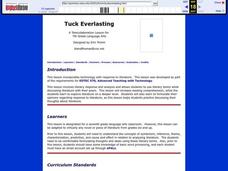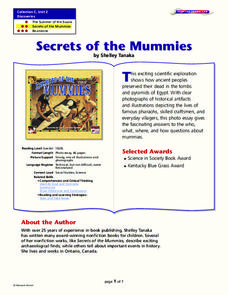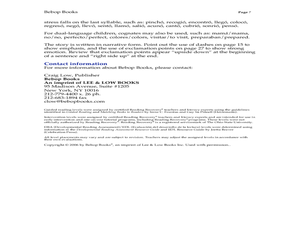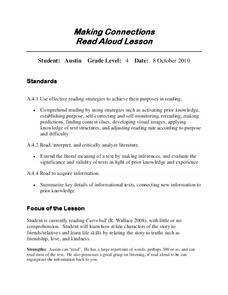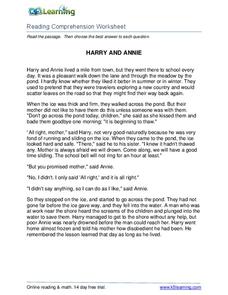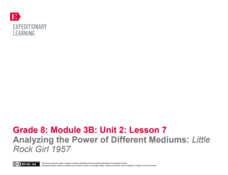Curated OER
Tuck Everlasting
Seventh graders use literary terms while discussing literature with their peers. They explore literature on a deeper level. Students formulate their opinions regarding response to literature, as this lesson helps students practice...
Curated OER
Questioning
Practice making predictions by looking at the cover of a book. You can use The Hungry Thing, as suggested here, or any other book you may be reading in class. Use the predictions to talk about good reading strategies. A chart is...
Curated OER
Secrets of the Mummies
How did the ancient people of Egypt preserve their dead so well that their bodies are still recognizable today? Learn the painstakingly complex process they used for preservation. Young scholars read and summarize a narrative detailing...
Curated OER
Guided Reading with Elizabeti's Doll
Practice reading strategies using Elizabeti's Doll by Stephanie Stuve-Bodeen. Readers utilize decoding and comprehension strategies before, during, and after reading the story. A detailed list of text features, high frequency words,...
Curated OER
Reading Comprehension: Voice of Nature
Understanding a text can be a very interesting task. Fourth graders read a passage describing the origin of an Aboriginal myth. They answer 11 comprehension questions that require them to pull key details, use context, and think...
National Park Service
A Tale of Two Men
Theodore Roosevelt and the Marquis de Mores were both born in 1858, and both came to the Dakota territory in 1883, but they influenced the developing country of America in different ways. Elementary and middle schoolers apply written and...
EngageNY
Contrasting Perspectives: Should the Farmworkers in Esperanza Rising Go On Strike? (Chapter 12: "Los Esparragos/Asparagus")
Explore multiple perspectives through a jigsaw activity that will improve your pupils' understanding of the characters in Esperanza Rising as well as their understanding of strikes and human rights. Tapping into prior knowledge, and...
Great Books Foundation
On the Origin of Species
How did Charles Darwin support his controversial theory of evolution with evidence? Use an excerpt from his 1859 work On the Origin of Species to reinforce the importance of making inferences within an informational text, and to...
Great Books Foundation
The Road Not Taken
Every time you make a choice, it prevents another option from taking shape. Spend some time analyzing "The Road Not Taken" by Robert Frost with a reading activity that includes four discussion questions that recall evidence from the text.
Curated OER
Making Inferences about Problem and Solution
Students use unfamiliar objects to make inferences. In this making inferences lesson, students make guesses about what an item does. Students brainstorm together and make lists of ideas and write them on index cards. The teacher gives...
Curated OER
Inference By Analogy
Students infer the use or meaning of items recovered from a North Carolina Native American site based on 17th-century European settlers' accounts and illustration.
Crafting Freedom
Harriet Jabocs and Elizabeth Keckly: The Material and Emotional Realities of Childhood in Slavery
Learning how to make accurate inferences by putting together facts found in multiple sources is one of those skills all learners must develop, but one that can be a challenge to teach. This resource is a must-have for your curriculum...
Curriculum Corner
ELA Common Core Checklists for K-6
In the hustle and bustle of life in the classroom, it's easy for teachers to lose track of the standards they have taught, and those that still need to be addressed. This Common Core checklist provides educators with an easy-to-use...
Curated OER
"Jabberwocky": Inferring
Pupils, over an extended time, read and explain the nonsense words of Lewis Carroll's poem, "Jabberwocky". They infer the meaning of the poem using visualizing as well as decoding skills. While written for first graders, this is easily...
Curated OER
Inferring Character Traits
Here is a lesson which is "flexible," and can operate as an individual or whole class activity. After reading a book of their choosing, with the use of a semantic map, learners identify character traits. They infer how their feelings...
Brethren High School
Romanticism Through the Eyes of Art, Poetry, and Technology
Use this simple collaborative activity to introduce the definition, art, and poetry of romanticism. Educators will have to provide the poetry, images of the art, and the survey for the learners, but by using this resource, they won't...
Curated OER
Making Connections
Fourth graders investigate visual imagery to aid reading comprehension. In this reading strategies lesson, 4th graders discover how visual imagery helps in comprehending a story. Students use a reader's notebook to record connections.
Curated OER
Questions/Inferring
In this literature worksheet, students will analyze a story and prepare the chart by completing the two columns entitled "I wonder" and "I think" in accordance with a particular passage or piece of literature. Students will use...
K5 Learning
Harry and Annie
Henry and Annie are on thin ice—literally! Read about the siblings' winter walk and the importance of staying safe with a short passage and four follow-up questions.
K12 Reader
Little Women: Helping Father
Jo's decision to sell her hair to bringing her wounded father home is a pivotal and poignant scene from Louisa May Alcott's Little Women. Class members read the excerpt and answer four questions about the details, vocabulary, and plot...
August House
The Great Smelly, Slobbery, Small-Tooth Dog
Read the story The Great Smelly, Slobbery, Small-Tooth Dog: A Folktale from Great Britain by Margaret Read MacDonald and choose from multiple activities to learn about the tale's theme—kindness. With so many options, your kind kids will...
K5 Learning
Humming Birds
Seeing a hummingbird in the wild can be a magical experience. Learn more about these delicate members of the animal kingdom with a short reading passage, complete with four short-answer questions.
EngageNY
Analyzing the Power of Different Mediums: Little Rock Girl 1957
Scholars begin the instructional activity by watching a video of media history and discussing it in a Turn and Talk. They then look at the texts A Mighty Long Way and Little Rock Girl 1957 to make a connection to the role of the press in...
Curated OER
Lessons in Looking: Contraband in Paintings
Using the paintings On to Liberty and A Ride for Liberty, 10th graders analyze historical perspectives on life after the Civil War. They attempt to determine what the Civil War meant for free slaves, then read a paragraph highlighting...


